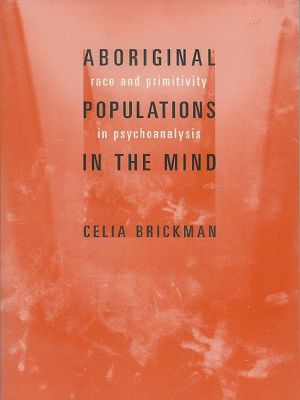Aboriginal Populations in the Mind

- Authors
- Brickman, Celia
- Publisher
- Columbia University Press
- Tags
- psy015000 , psychology , history , psy026000 , movements , psychoanalysis
- ISBN
- 9780231500890
- Date
- 2003-09-05T00:00:00+00:00
- Size
- 16.69 MB
- Lang
- en
What part does racial difference play in psychoanalysis? What can be learned when considering this question from a postcolonial perspective? In this subtle and commanding analysis, Celia Brickman explores how the colonialist racial discourse of late-nineteenth-century anthropology found its way into Freuds work, where it came to play a covert but crucial role in his notions of subjectivity. Brickman argues that the common psychoanalytic concept of "primitivity" as an early stage of psychological development unavoidably carries with it implications of an anthropologically understood "primitivity," which was conceived by Freud -and perhaps still is today -in colonialist and racial terms. She relates the racial subtext embedded in Freuds thought to his representations of gender and religion and shows how this subtext forms part of the larger historicizing trend of the psychoanalytic project. Finally, she shows how colonialist traces have made their way into the...
What part does racial difference play in psychoanalysis? What can be learned when considering this question from a postcolonial perspective? In this subtle and commanding analysis, Celia Brickman explores how the colonialist racial discourse of late-nineteenth-century anthropology found its way into Freud´s work, where it came to play a covert but crucial role in his notions of subjectivity. Brickman argues that the common psychoanalytic concept of "primitivity" as an early stage of psychological development unavoidably carries with it implications of an anthropologically understood "primitivity," which was conceived by Freud -and perhaps still is today -in colonialist and racial terms. She relates the racial subtext embedded in Freud´s thought to his representations of gender and religion and shows how this subtext forms part of the larger historicizing trend of the psychoanalytic project. Finally, she shows how colonialist traces have made their way into the blueprint for the clinical psychoanalytic relationship and points to contemporary trends in psychoanalysis that may make possible a disengagement from this legacy.
What part does racial difference play in psychoanalysis? What can be learned when considering this question from a postcolonial perspective? In this subtle and commanding analysis, Celia Brickman explores how the colonialist racial discourse of late-nineteenth-century anthropology found its way into Freuds work, where it came to play a covert but crucial role in his notions of subjectivity. Brickman argues that the common psychoanalytic concept of "primitivity" as an early stage of psychological development unavoidably carries with it implications of an anthropologically understood "primitivity," which was conceived by Freud -and perhaps still is today -in colonialist and racial terms. She relates the racial subtext embedded in Freuds thought to his representations of gender and religion and shows how this subtext forms part of the larger historicizing trend of the psychoanalytic project. Finally, she shows how colonialist traces have made their way into the blueprint for the clinical psychoanalytic relationship and points to contemporary trends in psychoanalysis that may make possible a disengagement from this legacy.